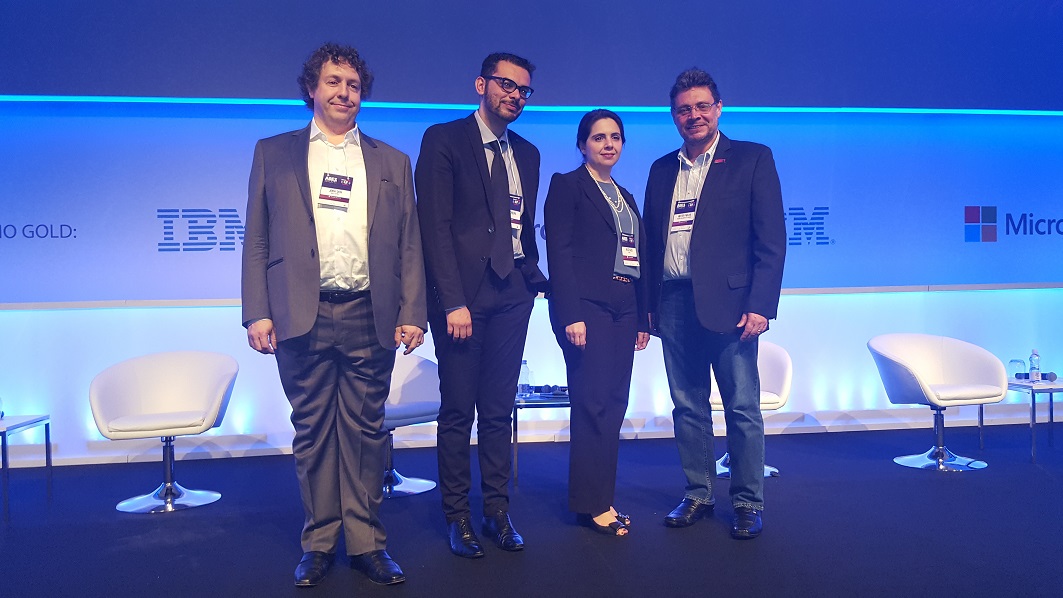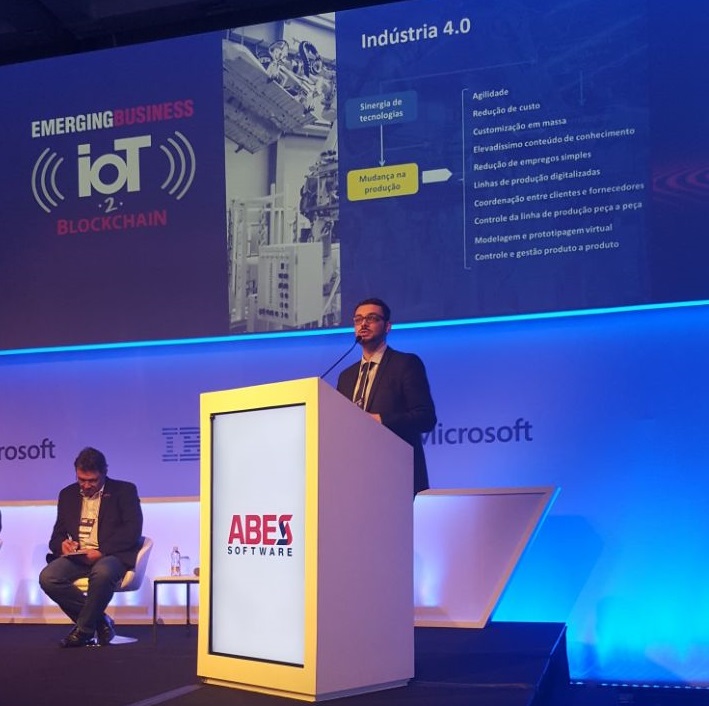Held on September 18, in São Paulo, ABES SOFTWARE CONFERENCE 2017 had as its central theme “Emerging Businesses: from Blockchain to IoT” and featured the panel “Entrepreneurship, Innovation and Business Opportunities”, which featured lectures that were complemented the subjects discussed and confirmed the change of era that we are living. The moderation was performed by Werter Padilha, entrepreneur and coordinator of the IoT Committee of ABES.
dual transformation
Prof. Dr. Eduardo Costa, director of LabChis (Laboratory of Humane, Smarter and Sustainable Cities, began his presentation with the proposal to talk about how large and established companies can “surf” the waves of innovation, given the need to protect and expand businesses and assets, defend the brand built and its market position. “Many organizations are implementing innovation processes based on the concept of Dual Transformation, in which the company 1) focuses on what it does best, improving that service or product from new technologies; and 2) bet on a significant innovation, capitalizing on some of the company's main assets, whether from internal studies or from new businesses coming from a startup”.
Costa points out that entrepreneurs need to be aware of early signs of disruption, such as slowing growth rates, changes in consumer behavior and the arrival of startups, among other factors. As a positive example of a double transformation, the expert cited Adobe, which was the first large company to adopt, in 2008, the SaaS sales model – software as a service. For those who want to delve deeper into the subject, the speaker recommended reading the book “Dual Transformation”, by Scott Anthony.
Access the presentation here.
BNDES and changes in development policies
In his presentation, Irecê Kauss, superintendent of Development and Innovation at BNDES, recalled that the bank has long been dedicated to knowing, supporting and developing the software and IT sector and that this policy will continue and will be improved. “Prosoft ended and became a line of financing called Finem TI, incorporated into the BNDES portfolio. We started to carry out some financing operations and accepted guarantees on receivables, considering the difficulties of IT companies in offering real guarantees”, he explained.
As financing alternatives for MSMEs, Kauss mentioned the Developer Portal, a new tool that facilitates MSMEs' access to BNDES financing lines through accredited banks, and the BNDES Credit Card, which already has 2400 software companies registered and more than 8 thousand items of products and services offered in this segment. This card can even be used to obtain certifications. The executive also spoke about the advances in the National IoT Plan, which is in the final stages of preparation and will be released by October. The reports and mappings produced so far are available for consultation on this site.
Check the presentation.
The fourth industrial revolution
Rafael Moreira, special advisor for Industry 4.0 and director of Innovative Technologies at the Ministry of Industry, Foreign Trade and Services (MDIC), highlighted that there is no way for governments to design public policies without considering the fourth industrial revolution and all the profusion of disruptive technologies, such as robotics, big data, augmented reality, 3D printing, internet of things, among others. “These are enabling technologies that permeate all industrial sectors. Even the Brazilian government will have to completely change the way it shapes industrial policies, whether for the domestic market or in international foreign trade agreements, such as Mercosur,” he explained.
The executive said that Brazil has sought inspiration in the United States, China and also in European countries, carrying out studies on productivity gains and synergies between technologies, which have broken down intersectoral boundaries, will change global value chains, labor market and employability. “We have a group of around 150 people, of which ABES is a part, with the aim of structuring a proactive agenda for Industry 4.0, with short, medium and long-term objectives, considering that the challenges and issues are enormous. We will soon announce objective measures to create a platform for Industry 4.0 in Brazil”, concluded Moreira.
See the presentation here.
Smart city and blockchain
This panel also featured a presentation by Jonny Doin, entrepreneur and CEO of Grid Vortex, who recalled the challenges posed by the increasingly fast speed of the economy and the acceleration of technological transformations that affect business concepts. “With smart cities, the intangible cyber world takes shape from smart infrastructures, from IoT devices, which are increasingly priced,” he noted. IoT devices will be measuring electricity and water consumption services, generating data and stimulating big data, performing cryptographic biometrics, access and people controls, logistics and contract compliance, among other applications.
“One of the important things that we need to analyze and address in this scenario is resilience to cyber attacks in order to give more trust in transactions, imperatives that blockchain technology can solve. “Ten million IoT devices in a city, for example, without security are like 'weapons' in the hands of cybercriminals. Unsecured IoT has great potential to bring us legal risks, privacy breaches, transaction fraud,” warned Doin. “Blockchain in smart cities creates a timeline of non-fraud events, ensuring traceability, record history and contract compliance. This technology enables highly reliable transactions, ensures cybersecurity and resilience to attacks, in addition to having decentralized management and redundancy, as data files are kept in multiple locations,” he concluded.
Access the presentation here.

.jpg)















